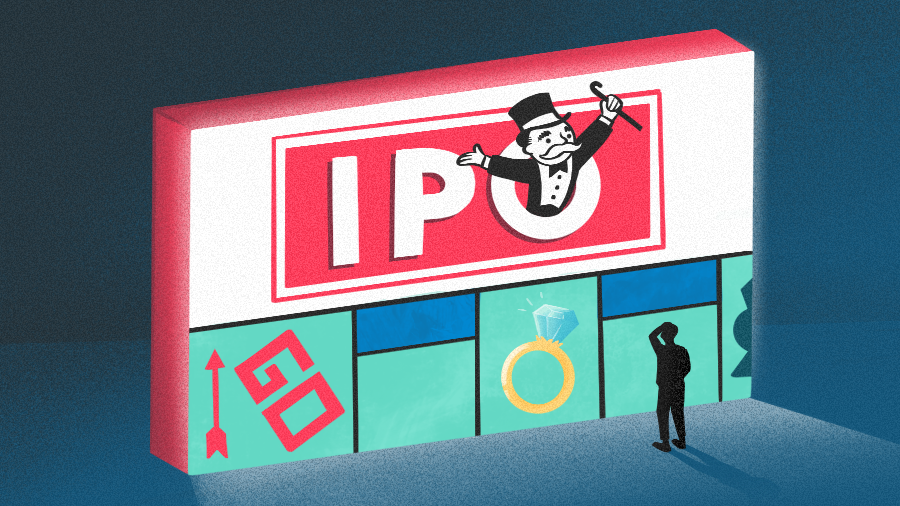In normal times, going public at a valuation of over $10 billion is both a rare occurrence and a very big deal.
In 2021, however, such enormous IPOs became rather common, even for money-losing startups.
More than 20 global companies made debuts on the Nasdaq and NYSE that year at initial valuations above $10 billion. The list included some of the buzziest names in tech and the app economy: ride-hailing platform Didi, EV maker Rivian, Southeast Asian “superapp” Grab, and crypto platform Coinbase.
Valuations reached nosebleed altitudes. Per Crunchbase data, the initial valuations of all companies that went public in 2021 on the two largest U.S. exchanges collectively exceeded a trillion dollars. Startups 1 delivered some of the biggest debuts.
Since then, these buzzy names have also posted some of the largest post-peak declines. To illustrate, we used Crunchbase data to assemble a curated list of the largest offerings of 2021, comparing initial valuation to present one:
Big decline
Overall, valuations of the selected largest startup offerings of 2021 are down 60% from their initial level. But as a group, post-debut performance has been quite mixed.
On the positive side, Samsara, an Internet of Things data platform provider, stands out as a star performer. Its shares are actually worth more today than they were when the company went public in December 2021.
Brazilian digital banking provider Nubank has also done comparatively well, being down only about 10% from its valuation post-offering.
Others are in much worse shape.
In terms of billions in market cap loss, Didi stands out for having shed $56.5 billion from its public valuation. The company also delisted from the NYSE last year. Rivian is a not-too-distant second, having given up $48.1 billion in market cap since its November 2021 IPO.
As for percentage declines, the worst on our list is health insurer Bright Health Group, which has shed more than 99% of its value since its June 2021 IPO. Tuya, a China-based IoT technology platform that co-listed in Hong Kong, has also performed poorly, with shares down over 92% from IPO day.
No wonder investors aren’t excited about IPOs
The poor aftermarket performance of the Class of 2021 IPOs may be one factor that’s prevented us from seeing a resurgence in new startup debuts.
Even though the big IPOs of recent months, including Arm Holdings, Instacart and Klaviyo, involved profitable companies at post-bubble valuations, investor appetite remains muted. Currently, all three are trading well below their peak first-day prices.
Meanwhile, there remains a considerable backlog of still-private unicorns contemplating a market debut should conditions improve. Perhaps if some of these boom-era offerings recover, that’d go a long way toward re-opening the window.
Related Crunchbase Pro query:
Related Reading:
- These Are The Tech Companies That Went Public In 2021, A Record Year For IPOs
- Unicorns Are Thawing Out IPO Plans
- 2023’s Startup IPOs Have A Very Mixed Track Record
- Many Of 2021’s IPOs Have Flopped. What Does That Mean For 2023’s Hopefuls?
Illustration: Dom Guzman
Search less. Close more.
Grow your revenue with all-in-one prospecting solutions powered by the leader in private-company data.
We use the term “startup” somewhat loosely here as some of the companies on the list are over a decade old. To make the list, companies need to have characteristics of startups, such as venture backing and being considered growth-stage rather than mature companies.↩

Stay up to date with recent funding rounds, acquisitions, and more with the Crunchbase Daily.






![Illustration of 50+ woman on smartphone. [Dom Guzman]](https://news.crunchbase.com/wp-content/uploads/2021/01/Femtech_-300x168.jpg)

![Illustration of pandemic pet pampering. [Dom Guzman]](https://news.crunchbase.com/wp-content/uploads/2021/03/Pets-2-300x168.jpg)

67.1K Followers